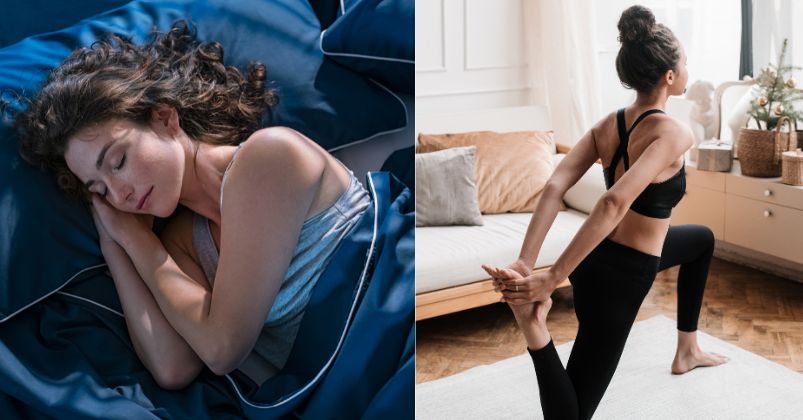Sleep and Exercise: The Connection and Benefits
Sleep and exercise are two of the most important factors contributing to a healthy lifestyle. Getting enough sleep and engaging in regular exercise can have a positive impact on our physical and mental well-being. However, the relationship between sleep and exercise is complex and multifaceted, and many factors can affect how one impacts the other.
Understanding the relationship between sleep and exercise is crucial for anyone looking to improve their health and well-being. Studies have shown that exercise can improve sleep quality, while poor sleep can negatively impact exercise performance.
Additionally, many different types of exercise can have different effects on sleep, and certain sleep disorders can also impact exercise capacity. By exploring the science behind sleep and exercise, we can gain a deeper understanding of how to optimize both for maximum benefit.
Understanding Sleep And Exercise

Sleep and exercise are two essential components of a healthy life. They have a bidirectional relationship, meaning that regular exercise can help you sleep better, and better sleep can improve your athletic performance.
Studies have shown that regular physical activity is associated with better sleep quality, increased total sleep time, and decreased sleep onset. However, the type and timing of exercise can also impact sleep quality.
For example, high-intensity workouts close to bedtime may increase core body temperature and interfere with sleep onset. At the same time, moderate aerobic exercise during the day can promote restful sleep at night.
In addition to improving sleep quality, exercise can also help reduce stress, anxiety, and depression, all of which can interfere with sleep. Exercise has also been shown to decrease the risk of chronic diseases such as heart disease, stroke, and diabetes, which can also impact sleep quality.
Sleep hygiene is essential for optimal rest, and regular exercise can help establish a healthy sleep routine. However, it is important to note that exercise alone may not be enough to treat sleep disorders such as insomnia or obstructive sleep apnea (OSA).
If you suspect you have a sleep disorder, it is essential to seek medical attention from a qualified healthcare provider.
It is also important to note that age can impact the relationship between sleep and exercise. Older adults may have difficulty with sleep onset and maintaining sleep, and exercise can help improve sleep quality and duration.
However, it is important to consult with a medical director or healthcare provider before starting a new exercise routine, especially if you have any underlying health conditions.
Overall, regular exercise, combined with good sleep hygiene, can help promote a healthy life and improve both physical and mental well-being. Whether you prefer walking, biking, swimming, or weightlifting, incorporating moderate-intensity exercise into your routine can help promote restorative deep sleep and improve overall sleep quality.
The Science Behind Sleep And Exercise
Regular physical activity and quality sleep are both essential for maintaining good health. The relationship between sleep and exercise is complex and multifaceted. In this section, we will explore the science behind the impact of exercise on sleep and the impact of sleep on exercise.
Impact Of Exercise On Sleep
Exercise enhances sleep quality and duration by improving total sleep time, slow-wave sleep, and REM sleep, as supported by a Journal of Clinical Sleep Medicine study. These benefits stem from exercise's positive impact on the circadian rhythm, which regulates the sleep-wake cycle.
However, intense exercise within three hours of bedtime may disrupt sleep by raising heart rate, body temperature, and adrenaline levels. While some studies suggest no negative effects from pre-bed exercise, it's generally best to avoid vigorous activity close to bedtime.
Impact Of Sleep On Exercise
Sleep is crucial for exercise performance and recovery. Poor sleep affects performance, reaction time, and decision-making while increasing injury and illness risks.
During sleep, growth hormone is released, aiding muscle repair and growth. Athletes should prioritize sleep to maximize workout benefits.
Sleep and exercise have a bidirectional relationship: exercise improves sleep, and good sleep enhances exercise performance. Consistent exercise and sufficient sleep are key to achieving the best results.
Types Of Exercise For Better Sleep
Different types of exercise can help improve your sleep quality. Here are some of the most effective ones:
Aerobic Exercise
Aerobic exercises like walking, jogging, cycling, or swimming boost heart rate and improve sleep quality, helping you fall asleep faster and reducing sleep disorders like apnea and restless legs syndrome.
Aim for 150 minutes of moderate or 75 minutes of vigorous aerobic activity weekly, or combine both. Avoid intense workouts close to bedtime to prevent sleep disruption.
Yoga And Meditation
Yoga and meditation reduce stress and tension, common sleep disruptors, through gentle movements and relaxation techniques. A study in JAMA Internal Medicine found practicing yoga for 12 weeks improved sleep quality and reduced reliance on sleep aids.
Some yoga poses that can help improve sleep include:
- Child's pose
- Legs up the wall pose
- Corpse pose
- Forward fold
- Cat-cow pose
Meditation, like mindfulness, helps improve sleep by reducing stress and promoting relaxation. Practicing for a few minutes before bed or during the day can enhance your sleep quality.
Resistance Exercise
Resistance exercises, like strength training with weights or bands, boost muscle strength and improve sleep quality. A study in the Journal of Sleep Research found they enhance slow-wave sleep and reduce daytime sleepiness in older adults with insomnia. Aim for at least two sessions weekly, targeting major muscle groups with exercises like squats, push-ups, or lunges.
In conclusion, aerobic exercises, yoga, meditation, and resistance training are all effective for better sleep. Choose what fits your lifestyle and practice consistently for the best results.
Sleep Disorders And Exercise
When it comes to sleep disorders, exercise can be a helpful tool in managing some of the symptoms. However, it's important to note that not all sleep disorders are the same, and exercise may not be effective for everyone. In this section, we'll explore how exercise can impact three common sleep disorders: Insomnia, Sleep Apnea, and Restless Legs Syndrome.
Insomnia And Exercise
Insomnia, marked by trouble falling or staying asleep, can improve with regular exercise. Studies show exercise is as effective as sleep medications in easing symptoms.
The timing of exercise matters—morning or afternoon workouts work best for some, while evenings suit others. Avoid exercising too close to bedtime to prevent sleep disruptions. Find a routine that works for you.
Sleep Apnea And Exercise
Sleep apnea involves breathing pauses during sleep. While exercise isn't a cure, it can reduce symptoms and improve sleep quality.
Aerobic exercise, like running or cycling, is particularly effective for managing sleep apnea. Maintaining a healthy weight is also crucial, as excess weight can worsen the condition.
Restless Legs Syndrome And Exercise
Restless Legs Syndrome (RLS) is a sleep disorder characterized by an uncomfortable sensation in the legs, often accompanied by an irresistible urge to move them. While exercise may not be a cure for RLS, it can help manage some of the symptoms. Studies have found that regular exercise can lead to a reduction in the severity of RLS symptoms, as well as an improvement in overall sleep quality.
It's important to note that the timing of exercise can have an impact on its effectiveness for RLS. Some people find that exercising in the morning or early afternoon is most effective, while others may benefit from exercising in the evening. Additionally, it's important to avoid exercising too close to bedtime, as this can make RLS symptoms worse.
Overall, while exercise can be a helpful tool in managing some sleep disorders, it's important to work with a healthcare professional to determine the best course of treatment for your individual needs.
Exercise, Sleep, And Age
As we age, our sleep patterns change, and we may experience difficulty falling asleep or staying asleep. Exercise can play an important role in improving the quality of sleep in older adults.
Exercise And Sleep In Older Adults
Studies have shown that regular exercise can improve the quality of sleep in older adults. According to a systematic review, exercise interventions can increase total sleep time, reduce wake after sleep onset, and improve sleep efficiency in older adults.
In addition, exercise can also help reduce the risk of developing sleep apnea, a common sleep disorder in older adults. Exercise can help strengthen the muscles in the throat, which can prevent them from collapsing during sleep and causing breathing difficulties.
Exercise And Sleep In Athletes
Athletes face sleep challenges due to intense training and competition, but regular exercise can enhance sleep quality.
Studies show that exercise helps athletes fall asleep faster and stay asleep longer, improving performance. However, exercising too close to bedtime can disrupt sleep.
Incorporating relaxation techniques like yoga or meditation can further reduce stress and improve sleep quality.
Overall, regular exercise benefits sleep quality for all, enhancing health and wellbeing.
Conclusion
In conclusion, the relationship between sleep and exercise is complex but positive. Research shows that regular exercise improves sleep quality and duration.
Exercise helps regulate the sleep-wake cycle, increases sleep drive, and reduces symptoms of disorders like insomnia. It also improves mental health, reducing anxiety and depression, which contributes to better sleep.
The timing and intensity of exercise matter. Daytime exercise improves sleep, but exercising too close to bedtime or with high intensity can interfere with sleep.
Overall, regular exercise enhances physical and mental health, including sleep, but it's important to find a balance and consult a healthcare professional if needed.
References
https://www.ncbi.nlm.nih.gov/pmc/articles/PMC5385214/
https://www.sleepfoundation.org/physical-activity/exercise-and-sleep
https://health.clevelandclinic.org/how-exercise-affects-your-sleep/
https://www.sleepfoundation.org/athletes-and-sleep/sleep-and-athletic-performance
FAQs
Sleep plays an important role in exercise performance and recovery. Lack of sleep can lead to decreased energy, decreased motivation, and increased risk of injury. On the other hand, getting enough sleep can improve reaction time, speed, and accuracy, which can be beneficial for athletes and fitness enthusiasts.
Exercise can help improve the quality and duration of sleep, while sleep can help improve exercise performance and recovery. This is because exercise helps to reduce stress and anxiety, which can interfere with sleep, and sleep helps to repair and restore the body after exercise.
Yes, if you exercise more, you may need to sleep more to allow your body to recover properly. This is because exercise can cause muscle damage, which requires adequate sleep for repair and growth. Additionally, exercise can increase energy expenditure, which can make you feel more tired and in need of more sleep.
Some people may experience difficulty sleeping after exercise, especially if they exercise close to bedtime. This may be due to increased body temperature, heart rate, and adrenaline levels, which can interfere with sleep. However, regular exercise can help improve sleep quality and duration over time.
Exercise before bed can cause insomnia in some people, especially if they have difficulty winding down after exercise. However, this is not the case for everyone, and some people may find that exercise before bed helps them sleep better. It is important to listen to your body and pay attention to how exercise affects your sleep.
Yes, regular exercise can help improve sleep quality and duration, as long as it is not done too close to bedtime. Exercise helps to reduce stress and anxiety, which can interfere with sleep, and it also helps to regulate the body's natural sleep-wake cycle. However, it is important to find the right balance and avoid over-exercising, which can lead to fatigue and sleep disturbances.








